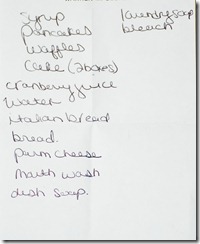Looking for educational activities for younger kids? Check last week’s installment: 5 Educational Summer Activities for Kids – Early Elementary.
I mentioned before that I have a love/hate relationship with summer.
To keep my twins from just attacking the XBox every day, I designed a bunch of fun summer activities, many that taught important life lessons. Let’s tackle those games I used when they were from third grade till about 6th or 7th grade.
Steal These Ideas!
If you have kids between the ages of 9 and 14, and wonder how you’ll keep the family entertained all summer, here’s a well-used list of activities that I can personally endorse…because we did them all.
Next week we’ll move into the High School years.
1) Grocery Store – Good news parents: if you plan correctly, the grocery store game only gets better as kids get older. At this age we had a couple of games. First we planned the trip to the store. Not only did they help me find valuable coupons, but they also searched online for deals on items we knew we’d need. This wasn’t just educational, it actually saved me time and money. At the store, each child had a personal list of items to find. After a few weeks we knew the store like the back of our hand and could get in and out in no time. The best news? They were so excited about the cash register and whether we made the budget or not that the “can I have one of these?” moments went out the window.
Why I Like It: At 17 I feel like my kids are already becoming savvy shoppers. They hunt for deals and are willing to compare costs before making a purchase.
2) Open a Savings Account – I’ll admit that we were late to the game here. We should have started this at 10 years old but didn’t get there until much later. My mistake. By taking kids into the bank and getting them acquainted with how it works, my kids already enjoy the banking experience. We compared different savings account options (even though they only had money at the time for the basic savings).
We talked about the difference between savings and checking, and decided together to forego the ATM card. The bank was great about this. I think so few kids are interested that they really enjoyed the fact that my kids seemed interested. We took a bank tour and they spent time answering all of my twin’s questions.
Why I Like It: I would have liked it better if I’d done this task at 10 years old with them (earlier ages, in my opinion, have limited “educational” returns). My kids both realize now how valuable a bank account is and how dangerous an ATM card can be. I think they’re getting close to ready for college and accounts on their own. At the very least, they’ll feel comfortable with the bank when they go to open their own account.
3) Start a Business – Lemonade stand. Carnival. EBay products. Dog sitting. Baby sitting. Heck, even blogging. Opening a business can be a rewarding experience, but not if you just hand junior a bunch of stuff and tell her to go sell it. If she keeps all of the proceeds, I think you’ve done her a disservice. Instead, create an overall plan for the business. Talk about an advertising campaign. Look at the cost of goods. Help them buy the product (via a loan from you) and then talk about their mark up. When they make money, they have to return the money they borrowed from you before making money. We had many little businesses along the way, and ran them this way each time.
Why I Like It: You’re teaching so many skills with this activity I can’t even begin here. Marketing (persuasive writing), technology, math, economics, are only a few of the skills kids will pick up while trying to learn to sell a product.
4) Board Games – Last week I mentioned what a game geek I am. Board games can teach kids so many money skills. An older game, Payday, is one of my favorites for financial lessons. You get paid once a month, pay bills and try to take advantage of opportunities (deals) when they arise. Buy insurance to guard against health and auto issues. On that note, another bad game but great teacher of financial lessons is Life. Have children, go to school (or not), buy insurance (or not), move up the career ladder. Sure, the game is very luck dependent, but it’s fun to move around the board and see just how many kids you can fit in that car (until you have to feed them….).
By age 12 kids will be able to grasp games that are better simulations, such as Agricola, Power Grid and Puerto Rico.They may not teach a child a ton about money today, but they do give kids a leg up on analytical skills and grabbing opportunities.
Why I Like It: Playing board games is a great way to teach lessons while playing as a family. I ‘m glad my kids like to play games. We generally aren’t competitive and have a few laughs together that I think we’ll all remember forever. (IF you want to purchase games listed AND help support the blog, you can use the Amazon links above to make your purchase. Thanks!)
5) Hold a Stock Tracking Competition – Step one of owning stocks is gaining a basic understanding about how the stock market works. Don’t think you know how it works well and worried you won’t be able to teach them? Learn together! Make a list of companies you admire. Research whether they’re public or not (and have stock that you can track). Give yourself an imaginary sum of money and invest!
We’d have a summer-long competition. The winner’s prize? They picked what we were having for dinner one night and we bought ice cream to celebrate.
Why I Like It: To effectively teach anything you have to brush up on skills yourself. I found that because I was teaching my kids, I paid better attention to my own portfolio.
What are your favorite activities with older children? Did you start any businesses at that age? Share in the comments!
Photo: Grocery List: MStewartPhotography; Lemonade Stand: EvinDC

